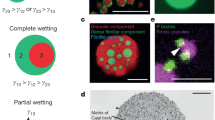Abstract
In Mr. W. B. Hardy's excellent “Historical Notes upon Surface Energy and Forces of Short Range” in NATURE of March 23, vol. 109, p. 375, he remarks that “the exact way in which the attractive forces act in causing the rise of fluid in capillary tubes and the spreading of fluid over solid and fluid surfaces is still obscure.” He evidently rejects all explanations by any Laplacean conception of molecular attraction. He probably holds that the explanation is to be sought in the modern electric theory of the constitution of matter, but that this theory has not as yet been developed far enough to throw sufficient light on the question. By the use of the term “attractive,” however, he restricts the inquiry to a limited class of forces in terms of which these phenomena are to be explained. It is just possible that this restriction may preclude the solution of the problem.
This is a preview of subscription content, access via your institution
Access options
Subscribe to this journal
Receive 51 print issues and online access
$199.00 per year
only $3.90 per issue
Buy this article
- Purchase on Springer Link
- Instant access to full article PDF
Prices may be subject to local taxes which are calculated during checkout
Similar content being viewed by others
Author information
Authors and Affiliations
Rights and permissions
About this article
Cite this article
TAYLOR, W. Capillarity. Nature 110, 377–378 (1922). https://doi.org/10.1038/110377a0
Issue Date:
DOI: https://doi.org/10.1038/110377a0
Comments
By submitting a comment you agree to abide by our Terms and Community Guidelines. If you find something abusive or that does not comply with our terms or guidelines please flag it as inappropriate.



